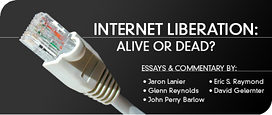Lead Essay
In our techno-Utopian dreams, the advance of the internet is “a little like a cross between Adam Smith and Albert Einstein; the Invisible Hand accelerating toward the speed of light,” says tech visionary Jaron Lanier in this month’s big-thinking lead essay. Yet, according to Lanier, we chug along saddled by the illusion that the Internet is mainly a technological rather than a cultural phenomenon. Software, Lanier argues, is “brittle” and can continue to function only when backed by what he calls “Antigoras”– “privately owned digital meeting arenas made rich by unpaid or marginally paid labor … tweaking the global system of digital devices so that the bits in the various pieces of software remain functional and meaningful.” Antigoras are indispensable, but “if software stays brittle,” Lanier says, “there will be a huge dampening effect on any hyper-speed takeoff plans of the digital elite.” Takeoff velocity requires a reorientation that acknowledges that the “the Net is precisely the generosity and warmth of humanity connecting with itself.”
Response Essays
Open source software guru Eric S. Raymond takes issue with Lanier’s characterization of “lock-in,” his antipathy to the command line, and his discussion of ambiguity. Raymond claims that if Lanier’s point was just that the Internet is “a conduit of expression between people,” then he would stop in agreement. But, he writes, “the actual point seems to be to maintain an opposition between capitalism and (gift) culture that I think is … mistaken.”
Glenn Reynolds — taking pieces from both Lanier and Raymond — argues that small proprietary zones within the big open Internet — “semigoras” in Lanier’s terms — might prove “very fertile places for innovation and growth on the Internet” with the potential to empower individuals and small groups to “achieve the worker’s paradise” through technology and markets.
Ten years after his “A Declaration of the Independence of Cyberspace,” John Perry Barlow insists that “the Internet continues to be an anti-sovereign social space, endowing billions with capacities for free expression that would have been unthinkable a generation ago.” A liberating future is still ahead, Barlow argues, but we must be on guard against a deep fact of both biology and markets: “New success inspires creativity. Old success tries to kill it.”
The Conversation
Related at Cato
Adam Thierer and Clyde Wayne Crews Jr., eds., Who Rules the Net?: Internet Governance and Jurisdiction (Washington, DC: Cato Institute, 2003).
Adam Thierer and Clyde Wayne Crews Jr., Everybody Wants to Rule the Web, TechKnowledge, Issue #69, December 31, 2003.
Robert Corn-Revere, Caught in the Seamless Web: Does the Internet’s Global Reach Justify Less Freedom of Speech?, Cato Institute Briefing Papers, No. 71, July 24, 2002.
Lawrence H. White, In What Respects Will the Information Age Make Central Banks Obsolete?, Cato Journal, Volume 21 Number 2, Fall 2001.
Clyde Wayne Crews Jr., One Internet is Not Enough, TechKnowledge, Issue #3, April 11, 2001.
Adam Thierer and Clyde Wayne Crews Jr., The Libertarian Vision for Telecom and High-Technology, TechKnowledge, Issue #1, April 3, 2001.
Tom W. Bell, Internet Privacy and Self-Regulation: Lessons from the Porn Wars, Cato Institute Briefing Paper No. 65, August 9, 2001.
Jonathan D. Wallace, Nameless in Cyberspace: Anonymity on the Internet, Cato Institute Briefing Paper No. 54, December 8, 1999.
George Gilder, “Regulating the Telecosm,” Cato Policy Report, Volume 19 Number 5, September/October 1997.
Dan L. Burk, How State Regulation of the Internet Violates the Commerce Clause, Cato Journal, Volume 17 Number 2, Fall/Winter 1997.
Bill A. Frezza, The Internet and the End of Monetary Sovereignty, the Cato Institute’s 14th Annual Monetary Conference, May 23, 1996.

